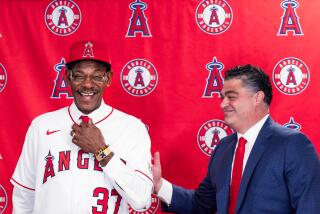Angel Notebook : Finley Tries to Show He Can Start <i> and </i> Finish
- Share via
TEMPE, Ariz. — Chuck Finley’s profile in the Angels’ 1989 media guide doesn’t quite make it to the bottom of page 35. It comes up a paragraph short, leaving a blank space that has been filled with a bright red All-Star game logo.
The joke around the Angels’ training complex is that Cookie Rojas had the final edit.
Rojas was Finley’s manager in 1988, Finley’s first year as a major league starting pitcher. A finishing pitcher, he was not. Finley had 29 of 31 starts interrupted by what he considered an all-too-quick hook. He usually started looking over at the dugout once he got beyond the fifth inning.
Finley might have been the most consistent member of the Angels’ rotation last season--his 4.17 earned-run average was a near match for Mike Witt’s 4.15--but you’d never know it from his won-lost totals. Finley finished 9-15, the most defeats by an Angel left-hander since Frank Tanana’s 19 in 1974.
Finley, however, wonders how different those numbers might look had he averaged more than six innings a start.
Fact: Finley was involved in 10 one-run decisions and five two-run decisions.
Fact: In nine of Finley’s losses, the Angels scored two runs or fewer.
“It’s easy to second-guess and look back, but I could’ve easily won 14, 15 games,” Finley said. “What-ifs and maybes don’t do you no good . . .
“(But) there were certain games where I must have given (Rojas) an indication that ‘I better get rid of him now.’ I did feel I got short-changed a few times.”
For that reason, Finley was gladdened by his outing Wednesday against the Seattle Mariners in a game won by the Angels, 4-3. He wasn’t overpowering--allowing five hits in three innings--and he didn’t get the win, but Finley pitched out of jams in every inning, delivering the ground-ball pitch he needed to start three double plays.
“That felt good,” he said. “I was pleased with the pitches I made. Getting the ground ball when you need it--that’s what it’s all about.”
In 1988, more often than not, Bryan Harvey or some other reliever would have been called upon to throw those pitches. Early in the season, Finley got into trouble during such tight situations--and Rojas never seemed to forget it.
In 1989, a new man manages the Angels. Doug Rader shies away from analysis of his predecessor--”Who am I to cast aspersions on someone else?”--but has his own ideas on handling pitchers through tough times, Finley in particular.
“You have to overcome those problems by facing them, confronting them,” Rader said. “If a guy has a problem along those lines, it’s usually not physical, but a mental thing. And it’s usually best left unsaid.
“The more attention you give it reinforces the behavior. You work on it through encouragement, and not bringing it up too often.”
So, without so much as a word, Rader kept Finley on the mound through three straight threatening innings, including a bases-loaded, one-out jam in the third.
And Finley responded--allowing one run but avoiding the big-inning fear of yesteryear.
Don’t mention it.
Angel Notes
Chuck Finley’s contract stalemate also was solved Wednesday, although not by him. On the eve of the owners’ meetings in Ft. Lauderdale, Fla., Angel vice president Mike Port decided to wrap up business before leaving Arizona. As a result, he ended negotiations with Finley by automatically renewing the pitcher’s contract for the 1989 season. . . . Pitcher Urbano Lugo agreed to terms with the Angels. . . . Injury and illness wiped out the Angels’ starting outfield. Left fielder Chili Davis was sidelined by a groin pull, center fielder Devon White fouled a ball off his foot during batting practice and right fielder Claudell Washington had the flu. They were replaced by Lee Stevens in left, Dante Bichette in center and Tony Armas in right. Not a bad second string, as it developed. All three had hits, with Bichette going three for five, and Stevens and Armas each driving in a run.
More to Read
Go beyond the scoreboard
Get the latest on L.A.'s teams in the daily Sports Report newsletter.
You may occasionally receive promotional content from the Los Angeles Times.






